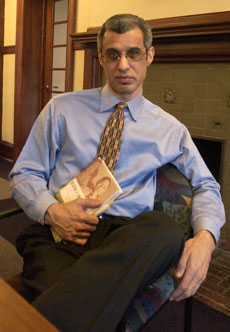Till film to be shown

Patrick Traylor
February 28, 2006
A photograph depicting the lynched body of Emmett Louis Till still resonates in the minds of Americans and brings back memories of a dark time in American history. The lynching that occurred more than 50 years ago still provokes questions about racial issues and segregation across America.
“Hate crimes do exist,” said Ashleigh Johnson, freshman in LAS. “Assumptions can be deadly, and we need to pay more attention to the truth about these issues, even today.”
On Tuesday night, the documentary film “The Untold Story of Emmett Louis Till” will be shown at 8:30 p.m. at the Illini Union Courtyard Cafe. Christopher Benson, associate professor of journalism and African-American studies, will lead a discussion immediately following the screening of the documentary.
Benson said it is important for people to learn about this event, in whatever means possible, whether that be a documentary, film or discussion of stories.
“The lynching of Emmett Till helped energize and galvanize the Civil Rights Movement,” Benson said. “Although 50 years may seem like a long time ago, it’s actually not.”
Get The Daily Illini in your inbox!
People need to understand the history and legacy of the Emmett Till lynching, and of racism in general, said Robert Lampley, president of EWEZO, the Central Black Student Union’s branch at Florida Avenue Residence Hall, and sophomore in LAS.
EWEZO, which means “black power” in Swahili, discussed racism and racial stereotypes after showing the film “Crash” in the residence hall during Black History Month.
“It is important that we continue to talk about these issues, as people are still experiencing them everywhere today,” Lampley said.
Benson co-authored a memoir on Till’s mother, Mamie Till-Mobley, titled “Death of Innocence: The Hate Crime That Changed America.” The book is about the life and death of Till, and the love and faith that helped his mother survive.
Benson said he met Till-Mobley through a mutual friend in 2002, and began talking to her about the death of her son. Six months later, Till-Mobley passed away. Benson conducted additional research and interviewed childhood friends of Till to make the story complete. The story was irresistible for him to tell, he said, as so many people have been moved by it.
“I think the important message that Mrs. Mobley wanted to get across is to understand the great sacrifices that were made,” Benson said. “We must understand the opportunities we have now, and we must be committed to them. Mrs. Mobley would have been overjoyed that we are getting her story out there.”
The picture of Till that was published is still controversial today. Benson said we can never return to what he called the horrible system of segregation.
Johnson said the Emmett Till documentary and discussion will be a good way for people to learn more about issues and voice their concerns.
“By looking more closely at the issue and learning about it, it helps dismantle racism,” Lampley said. “We become better equipped to deal with it in the future.”






